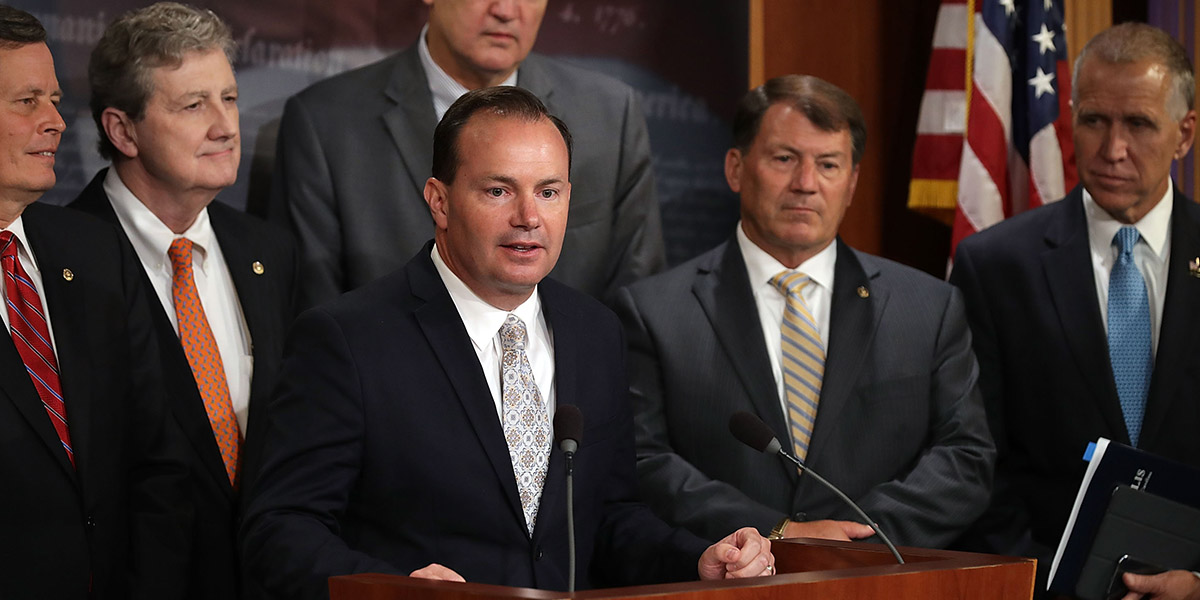Congress needs to raise the debt ceiling at the end of September in order for the government to continue to operate. At the same time, it should consider fundamental budget process reform, aimed at stemming the tide of red deficit ink spewing from Washington.
Senators Chuck Grassley, R-Iowa, and Mike Lee, R-Utah, introduced a balanced-budget amendment, S.J. Res. 7, in January. If ratified, it would contribute to a sounder fiscal policy. The amendment would require two-thirds of Congress to approve spending more than 18% of GDP in the prior calendar year; tax hikes; or increases in the debt limit.
Sen. Lee, who has introduced balanced budget amendments in prior years, said, "We expect families, businesses, and state and local governments all to stick to their budgets and live within their means — there is no reason that the federal government should not have to follow the same set of rules."
“The ceiling will eventually be raised, and Uncle Sam will not renege on debts. But this predictable drama continues to distract from more important issues...”
Congress has considered many balanced budget amendments in the past, but most did not pass either chamber. The Senate approved one in 1982, sponsored by the late Senator Strom Thurmond, R-S.C. The House passed one in 1995, sponsored by Representative Joe Barton, R-Texas. In each instance, the sponsor was a Republican and the GOP had a majority.
If Congress could craft a series of budgets that did not result in continually wider deficits, a balanced-budget amendment to the Constitution would not be necessary. But the budget process has broken down. The deficit is at $693 billion this fiscal year, or 3.6% of GDP. Total debt is projected to be over 100% of GDP.
If the balanced amendments of 1982 and 1995 were the law, America would have been in a far stronger fiscal position, with lower levels of deficits and debt.
States, which are not allowed to run deficits, generally manage to balance their budgets. Even with its imperfections, a balanced-budget amendment would be a step in the right direction, an improvement on what we have now.
Congress writes laws that lead to increased spending over time without further congressional action, so-called entitlements such as Medicare and food stamps. Reforming the latest entitlement, an expansion of Medicaid, proved the major obstacle in last week's failed repeal of the Affordable Care Act.
The Grassley-Lee amendment links government outlays to 18% of GDP in the prior calendar year. If it were law, the budget now under construction would be based on GDP in 2016.
This schedule might be too tight for planning purposes. The final GDP figure for calendar year 2016 was only available in March 2017. This timing is adequate for Congress, but not for the president, who sends his budget to Congress the first week in February. The president starts working on the FY 2018 budget in the fall of 2016, when even third-quarter GDP is unknown.
But if the FY 2018 budget were based on GDP in calendar year 2015, guidelines and limits would be clear to the president as well as to Congress.
Another way of structuring a balanced-budget amendment would be to tie spending in a given year to revenues three years earlier. The president and Congress would know in advance how much to spend. They would know that they could not spend more than revenues from calendar year 2015, which ended December 31, 2015.
One modification might be to have a "rainy day fund" that is exempt from the limits, and that could be set aside for recessions. This fund could be set aside from surplus funds in high-growth periods, just as states reserve rainy day funds. If deficit spending in a recession is discouraged for the federal government, just as it is for states, then the government should be provided with a way of ensuring that it has a means of meeting demands on social safety net programs during a recession.
Currently, programs are constructed so as to obligate the government to pay programs indefinitely. This leads to the current result that an increasingly larger share of the budget is obligated by prior Congresses, because few politicians have the courage to reduce benefits.
In contrast, if Congress could vote for a new program only as a percent of total spending, then the upward trend in program expenses would have to be approved as the program expanded. A housing program, for instance, could be set at 1.5% of spending. If revenues fell in a recession year, Congress would have to vote to maintain spending at the prior level.
The next two months are going to be dominated by headlines prophesying doom if Congress does not vote to increase the debt ceiling. The ceiling will eventually be raised, and Uncle Sam will not renege on debts. But this predictable drama continues to distract from more important issues, such as tax reform, health care reform, and confirmation of the 83 (at this count) nominees waiting to be confirmed by the Senate.
A balanced-budget amendment would impose spending discipline, and would protect the American economy against the down-to-the wire bargaining over spending and taxes that is a habitual feature of our budget process. Additional certainty about fiscal policy would make investment and consumption decisions easier, and would facilitate economic growth and job creation.
This piece originally appeared on Investor's Business Daily
______________________
Diana Furchtgott-Roth is a senior fellow and director of Economics21. She also served on the transition team for President Donald Trump. Follow her on Twitter here.
This piece originally appeared in Investor's Business Daily
